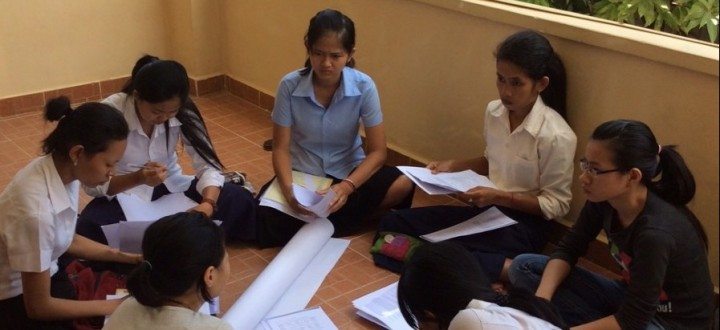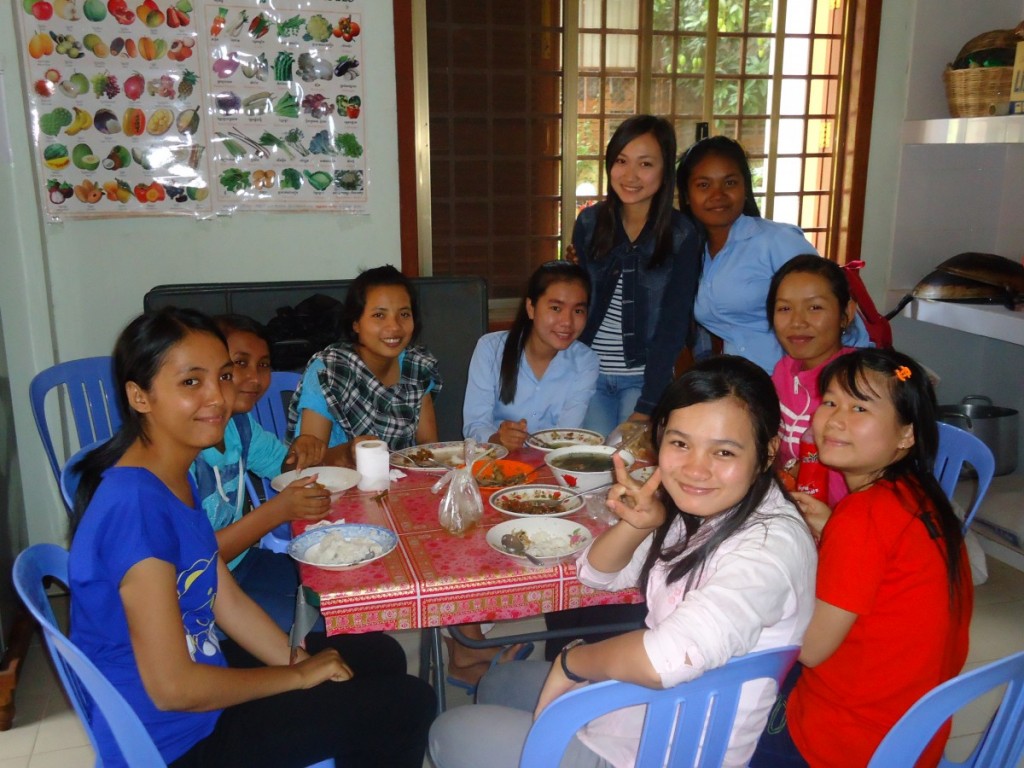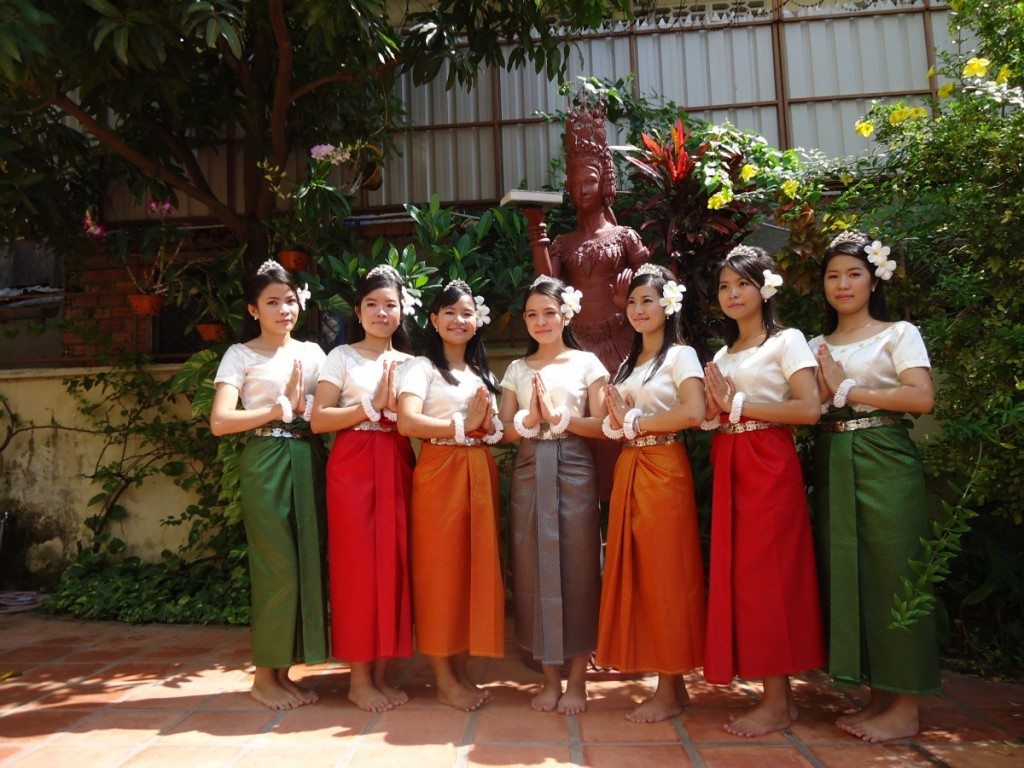In 2004, I met a courageous young woman who changed my life. Her name was Veasna Chea. She was about thirty years old at the time and working with the UN Commission on Human Rights in Cambodia. Like many Cambodians of her generation, some of Veasna’s family members had been killed in the Khmer Rouge genocide of the 1970s, and she had grown up poor. But her mother was determined that her daughter receive an education.
Overcoming great hardships and scarcity, Veasna managed to go to high school. Then she received a scholarship to the University of Law and Economics, in Phnom Penh. But the hardships weren’t over. Veasna and a handful of other female students had to live underneath the college building, in the six-foot crawl space between the bottom of the building and the mud, because there was no housing for female university students. Except for one small dormitory at the agricultural school, none of the universities in Cambodia provided housing for their students. That situation was not a serious problem for male students, who could live free in the Buddhist temples or rent cheap rooms in the city. But those options were not available to female students. The temples did not welcome female students, and many parents forbid their daughters from renting rooms in the city, fearing that they would be drawn into the thriving sex trade. Thus, because of the lack of housing, many young women in Cambodia, and especially the 90 percent living in the rural areas, were effectively excluded from higher education.
Veasna and her female classmates lived underneath the college building for four years. Despite that difficulty, Veasna graduated near the top of her class. After Veasna told me her story, she and I conceived of a dormitory for university women in Phnom Penh. I went back to the US and raised the money for the first such facility in Cambodia. That was the beginning of the Harpswell Foundation.
In the 1970’s, Cambodia endured one of the most brutal genocides of the twentieth century. The country lost an estimated two million people, a quarter of its population at the time, killed or starved to death by the Khmer Rouge. Especially targeted were people with education, considered a symbol of Western decadence and elitism. Today, Cambodia remains one of the poorest countries in Southeast Asia.
How does one begin to rebuild a country after such devastation? I believe through education and leadership, especially the education and empowerment of women. Numerous studies by the UN and other international organizations have shown that the education and empowerment of women is the single most effective way to help developing countries. Women are more likely than men to tend to the education and health care of their families, to safeguard the family finances, to hold the community together. In Cambodia, all sense of community was shattered by the brutal tactics of the Khmer Rouge, creating an “every man for himself” mentality. In Cambodia today, women have some opportunities in the private and public sectors, but wives are still considered the property of their husbands. Domestic violence and marital rape laws are only erratically enforced. Only a small percentage of government officials are women.
Our mission at the Harpswell Foundation is “to empower a new generation of women leaders in Cambodia.” Inspired by Veasna’s story, our first dormitory and leadership center for university women was completed in 2006, our second in 2010. The two facilities together house a total of 80 young women. Both are located in Phnom Penh, where our students attend twenty different universities. Our facilities provide free room and board, free medical coverage, and tuition assistance. Each facility has dormitory rooms, kitchens and bathrooms, a library, and an IT room with computers connected to the internet.
To select Harpswell’s students, each June we travel to 30 to 40 high schools around the country and interview the top four female seniors at each school. We accept 15 – 20 of this pool each year, based on the criteria of intelligence, ambition, and leadership potential. In selecting students, we view the young women not just as individuals but as potential agents of change. We want them to rebuild their country.
About two thirds of our students come from very poor families and most of the rest from middle class families. In all cases, they are the first generation in their families to receive a college education. Most of their parents are farmers. Many grew up in one-room houses with no plumbing or electricity. In each family, one of the parents, usually the mother, managed to get her daughter through high school. By contrast, the majority of girls in Cambodia are taken out of school at age 12 or 13 to work in the rice fields and then put into arranged marriages. Some are sold by their parents into sex slavery.
We give these special young women at Harpswell more than free room and board. We’ve developed an in-house academic program (that our students take in the evenings and weekends), which includes English lessons, analysis of national and international news, debate, analytical writing, the history of Cambodia, Southeast Asian geography and government, comparative genocide studies, nutrition and health, job skills, and work ethics. We have monthly leadership seminars, in which outstanding women leaders from Cambodia and around the world talk about their careers, the qualities that make a leader, and the special challenges that women face in becoming leaders. Finally, we have a “leadership residency” program in which English-speaking young women, many from the US, live with our students for three to six months, teach in our program, mentor our students, and introduce them to the world. As a whole, our in-house program places great emphasis on critical thinking, a skill and an attitude to learning not present in most Asian universities. After our first two years of operation, our students were first in their class at many of the major universities in Phnom Penh.
An essential part of Harpswell is the powerful sisterhood that develops among our students. They live together, cook and eat together, study together, and support one another emotionally as well as intellectually. This extended residential experience, combined with critical thinking skills and role models, are key to empowering a group of young people in a distressed environment.
At this point, we have 103 graduates, beginning with the class of 2010. Our graduates are working as lawyers in law firms, as project managers in NGOs, as journalists, as financial managers, as staff in the government ministries, as teachers, as business entrepreneurs. Thirty of our graduates have received scholarships for post-graduate study abroad, including at many fine American colleges and universities. (All must sign commitment letters saying that they will return to Cambodia after their education abroad.) A similar number have or will soon receive masters degrees. Our graduates have formed a Harpswell Alumnae Association so that they may stay in touch with each other, help each other get jobs, mentor the current students, and constantly reinforce the mission of Harpswell. Our alumnae are becoming a powerful wave that will help move Cambodia into the future.
In the future, we hope to globalize Harpswell, by joining with more international organizations committed to the empowerment of women, exchanging students with other countries, speaking at international conferences, and possibly building Harpswell-like facilities in other countries. One particularly attractive idea is a two-month summer institute in women’s leadership, based in Southeast Asia. Participants would be young women from several countries in the region, with an international faculty.
One of our graduates, Sokngim Kim (Class of 2012), recently said, “Before I came to Harpswell, I just stayed in one room. I never cared about what’s happening in the world. After Harpswell, I can see that the world is bigger. It’s not only one room.” Sokngim is now studying engineering at the University of Georgia in the United States. When she finishes, she will go back to Cambodia and build roads and bridges.
Photo from Harpswell Foundation.
Alan Lightman
Alan Lightman is an American writer, physicist, and social entrepreneur. He was educated at Princeton and at the California Institute of Technology, where he received a PhD in theoretical physics. Lightman has served on the faculties of Harvard and the Massachusetts Institute of Technology (MIT) and is currently professor of the practice of the humanities at MIT. His essays and articles have appeared in the Atlantic, Granta, Harper’s, the New Yorker, the New York Review of Books, Salon, and many other publications. His novels include Einstein’s Dreams, an international bestseller, and The Diagnosis, a finalist for the National Book Award. In 2005, he founded the Harpswell Foundation, whose mission is to empower a new generation of women leaders in Cambodia.








Pingback: Red Dirt Road Empowers Women From Michigan to Phnom Penh - New Global Citizen
Pingback: In Cambodia, Access to University Education Enables Women to Succeed - New Global Citizen